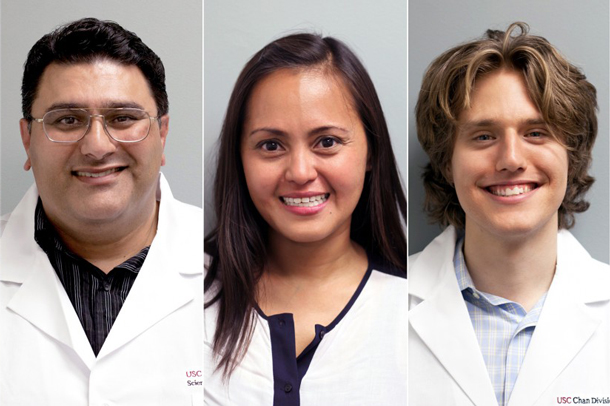More than 200 students will take their professional oaths and put on their white coats for the first time as occupational therapy students at the annual white coat ceremony held by the USC Mrs. T.H. Chan Division Occupational Science and Occupational Therapy on Aug. 28.
Here are some of the journeys that brought these future occupational therapists to the profession:
Back to school after 20 years
Helping others is a family affair for David Matharu, a ’95 USC graduate.
His parents owned seven residential facilities in Los Angeles for adults with developmental disabilities. His brother, Yogi Matharu, also a USC alumnus, is a practicing physical therapist who works as an assistant professor in the USC Division of Biokinesiology and Physical Therapy.
So when it came time for Matharu to start his own career more than 20 years ago, he decided to go into the family business by eventually establishing four single-family residences and a day program for adults with developmental disabilities.
It was while working at these various programs that Matharu witnessed firsthand the impact that occupational therapy can make on the life of someone with a developmental disability.
“Observing our occupational therapists while they worked with our clients and realizing the impact they make on the lives of these individuals is truly remarkable,” Matharu said.
Now 44, Matharu is headed back to school to not only be able to work more hands-on with his current patients but also to expand his horizons into other patient populations.
“The white coat ceremony is a new beginning, a first step,” Matharu said. “I look forward to wearing my white coat for the first time and assuming this awesome responsibility, as well as everything else that it entails.”
Preventing disability in the Philippines
It’s more than 7,000 miles and an 18-hour flight from Los Angeles to Cebu City in the Philippines.
But in the heart and mind of Aviril Sepulveda, an incoming student in the USC Chan Division’s doctor of occupational therapy degree program, it’s infinitely closer.
The Philippines-born and educated occupational therapist first came to the United States on a work visa in 2003.
In the ensuing years, Sepulveda has grown to be a bona fide pediatric therapy specialist, working with patients at Children’s Hospital Los Angeles and at Totally Kids, a sub-acute facility in the San Fernando Valley.
But when Sepulveda celebrates her entrance into the USC Chan Division’s doctoral program at Friday’s ceremony, her mind will most likely be focused on children living half a world away.
Her primary motivation to return to higher education is to improve the quality of life for Filipino children in her homeland, she said.
In the Philippines — and especially in rural, mountainous regions — occupational therapy is little appreciated and rarely delivered, which means children who might benefit from occupational therapy intervention develop greater degrees of otherwise avoidable disability.
Sepulveda and her sister, Bernardine “Berry” Sepulveda-Nikkel, who earned a master’s at USC in 2010, aim to change this, with a grassroots effort to bring occupational therapy to Filipino children.
“My motivation is to further my education and background in order to prevent disability in the Philippines,” Sepulveda said, “by bringing knowledge, early awareness and intervention.”
Succeeding with occupational therapy
Auston Stamm knows about the impact an occupational therapist can have on the life of someone struggling with everyday tasks.
Born with mild cerebral palsy, Stamm has been seeing an occupational therapist since he was first diagnosed with cerebral palsy at the age of 5.
Having cerebral palsy made school tough for Stamm; he remembers being bullied in fourth grade after a teacher told his classmates they had to wait for Stamm, who had difficulty writing, to copy all the notes from the chalkboard before they could go to recess.
With occupational therapy interventions, Stamm began adopting and adapting techniques and strategies to pass courses.
“Occupational therapy really changed my life,” Stamm said. “I would not have been able to succeed without it.”
Stamm went on to earn a bachelor’s degree in cinematography and film/video production from Loyola Marymount University before working for a production company that created movie trailers — work he ultimately found unfulfilling.
Remembering a film he made as an undergrad about students with learning disabilities, Stamm began to realize he wanted a career in which he could help others the way he had been helped.
He began shadowing occupational therapists in 2013.
“It was so inspiring to be in the room as these patients’ lives were being transformed,” Stamm said. “It reminded me of how far I’ve come and how I’d like to be able to give back.”


